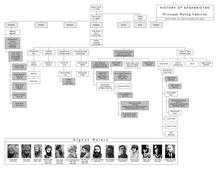Tarzi
The Tarzi (Pashto: طرزۍ) royal family is a branch of the Pashtun, Mohammadzai tribe of Afghanistan (who are a sub-tribe of the greater Barakzai clan). Although a smaller branch of the ruling Barakzai Dynasty, the Tarzi family has produced some of the most famous and affluent members. The founder of Tarzi family was Ghulam Muhammad Tarzi. [1]
History
The Tarzi Family has reached the ranks of an Afghan institution preaching modernization and progress. Through centuries of leadership, members of the family have held posts as rulers, thinkers, generals, public officials, members of the royal court, researchers, diplomats, and as the movers-and-shakers of Afghanistan. The family was born into the Barakzai Dynasty through royal Mohammadzai lineage.
The family descends directly from the Afghan King Sardar Payinda Khan Mohammadzai, Chief of the Barakzai. The family’s ancestry continued with Sardar Payinda Khan’s son, His Excellency Sardar Rahim Dil Khan. The powerful ruler born in 1796 became ruler of Sindh, Kandahar, and Baluchistan by 1823.
His Excellency’s son was Sardar Haji Ghulam Muhammad Tarzi who was granted the title Arjumand wa Daneshmand (the Highly Esteemed Honorable Scholar of the State). A notable scholar and poet, he fell out of favor with the Amir and was expelled. He was known for his writings on ethics, secular poetry, religion, and took the pen-name “Tarzi” (the intellectual). The family, moving to India, Baghdad, and the state guest of the Sultan in Istanbul, Turkey, eventually settled in Damascus, Syria. A year after the death of Amir Abdur Rahman Khan in 1901, his son Habibullah Khan invited the Tarzi family back to Afghanistan. Mahmud Tarzi, the son of Ghulam Muhammad Tarzi was given a post in the government from which he was able to introduce progressive ideas into the country. For this reason he is often credited for the modernization of Afghanistan. Tarzi's daughter, Soraya Tarzi, married King Amanullah Khan and become Queen of Afghanistan. Mahmud Tarzi took up a critical role in the history of Afghanistan, from famed poet to progressive leader.[2]
Ghulam Muhammad Khan had eleven sons who served the country well. Each with families the eleven sons prospered in great feats such as politics, science, academia, and much more. The history goes further back in Mohammadzai lineage with Sardar Payinda Khan Mohammadzai’s father and his father. However, due to the limited information available of that era, we will not focus on them until further research is done. [3]
Barakzai
The Tarzi family is a branch of the Pashtun, Mohamedzai tribe of Afghanistan (who are a sub-tribe of the greater Barakzai clan).[3]
The two branches of the Barakzai dynasty (Translation of Barakzai: sons of Barak) ruled Afghanistan from 1826 to 1973. The most prominent & powerful sub-clan of the Barakzai Pashtun tribe is the Mohammadzai clan of which the Tarzi family descends from.[4]
Notable individuals
- Ghulam Muhammad Tarzi: Founder of "Tarzi" name, ruler of Kandahar and Baluchistan.
- Soraya Tarzi: Queen of Afghanistan, grand daughter of Ghulam Muhammad Tarzi.
- Mahmud Tarzi: Statesman and Father of Afghan journalism.
- Sardar Painda Khan Mohammadzai: Grandfather of Ghulam Muhammad Tarzi, ruler of Kandahar, Sindh and Baluchistan
- Sardar Rahim Dil Khan Mohammadzai: Father of Ghulam Muhammad Tarzi, ruler of Kandahar, Sindh and Baluchistan
- Ghulam Yahya Tarzi: Afghan official and diplomat.
- Abdullah Tarzi: Afghan statesman; a senior legislator and "elder" of Kandahar.
- Habibullah Tarzi: Diplomat and Afghan Ambassador to the United States of America.
- Abdul Wahab Tarzi: Afghan diplomat and professor.
- Nanguyalai Tarzi: International diplomat and representative of Afghanistan.
- Amin Tarzi: Director of Middle East Studies at Marine Corps University.
- Zemaryalai Tarzi: Afghan archaeologist.
References
- ↑ http://www.royalark.net/Afghanistan/tarzi.htm
- ↑ Farhad Azad (ed.). "An Afghan Intellect: Mahmoud Tarzi". Afghan Magazine Article: July – Sept. 1997, by Yama Atta & Hashmat Haidari. afghanmagazine.com. Retrieved 2013-04-07.
- ↑ 3.0 3.1 http://www.tarzi.net/TarziHistory.html
- ↑ "Afghanistan". CIA. The World Factbook. Retrieved 2010-08-25.
